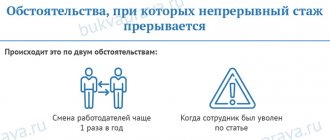Is it possible to be reinstated in the police service after leaving voluntarily?
Legal relations related to service in the Ministry of Internal Affairs are regulated by Federal Law No. 342-FZ “On service in the internal affairs bodies of the Russian Federation and amendments to certain legislative acts of the Russian Federation.” The grounds on which service in the authorities can be terminated and the service contract terminated are discussed in Article 82 of the Law.
To resign at his own request, a police officer must submit a corresponding report one month before the expected date of termination of service addressed to the head of the Ministry of Internal Affairs of the subject or the head of the police department (depending on the position held). Before the expiration of the month, even if there is only one day left, he has the right to withdraw his report and continue his service.
In some cases, an employee of the Ministry of Internal Affairs writes a report on dismissal from service at his own request not on his own initiative, but under the threat of termination of employment relations with him for negative reasons. In this case, he can go to court, where he will have to prove that the management of the Department of Internal Affairs forced him to write a letter of resignation.
Depending on whether the dismissal from the authorities was at his own initiative, or made under pressure, the police officer can be reinstated at work:
Articles on the topic (click to view)
- What to do and where to go if you are not paid upon dismissal
- What to do if you are laid off at work
- What to do if the employer does not want to fire at his own request
- What to do if the date of the dismissal order is later than the date of dismissal
- What to do if the employer does not give the work book after dismissal
- What to do if you didn’t work officially, you were fired, you didn’t get paid
- What is the employer obliged to give the employee on the day of dismissal?
- judicially;
- by re-entering the service in the Ministry of Internal Affairs.
How to Get Reinstated in the Police After Dismissal
Hello. It’s a non-standard situation and a correct answer is required, not an assumption, and I have enough assumptions =) If a person leaves the police at the internship stage, or rather the PSB of the Ministry of Internal Affairs (since 2021, the Russian National Guard), when he got a job, then.
- How to reinstate yourself in the Ministry of Internal Affairs after dismissal
- How to rejoin the police
- How to reinstate yourself into service in the Ministry of Internal Affairs
Hello! Can I be reinstated in the police service after six months? Resigned of his own free will
How to be reinstated at work in the Ministry of Internal Affairs after dismissal of your own free will? (read more…)
Up to what age is this available?
For the first time, a citizen of the Russian Federation who has not reached the age of 35 can join the police for positions held by ordinary and junior command personnel. If a candidate applies for positions of middle, senior and senior management, then he must be no more than 40 years old at the time of entry into service.
The situation is different with persons who previously worked in the police and were then dismissed from service at their own request. In this case, they have the right to be reinstated in their position or re-enter the service before they reach the age limit established by Article 88 of Federal Law No. 342-FZ. The maximum age for such persons is:
- 65 years for employees who have been awarded special ranks not lower than major general of police, justice or internal service;
- 60 years for employees holding the rank of colonel of police, justice or internal service;
- 55 years for employees who have been awarded the special ranks of major or lieutenant colonel of the police, justice or internal service;
- 50 years for persons who have been awarded other special titles.
The situation is similar with internal affairs officials dismissed from the authorities for negative reasons. Read about the procedure for dismissal for negative reasons here.
If, at the time of the court’s decision, the former employee reaches the service age limit, he will be denied reinstatement at work, however, if violations are identified during the termination of the employment relationship, the court may change the wording of the dismissal recorded in the work book to dismissal at his own request.
How can a former employee return to work?
In order to return to work in the police force after voluntary dismissal, the future employee will need:
- submit a corresponding application addressed to the head of the Ministry of Internal Affairs of the subject or police department;
- fill out the form;
- write an autobiography;
- pass a medical examination;
- pass a military medical commission that determines the possibility of serving in the internal affairs bodies;
- pass physical fitness standards.
You will also need to submit:
- passport;
- work book;
- military ID;
- diploma of education;
- conclusion of medical and military medical commissions;
- certificate of no criminal record;
- a certificate confirming that the candidate for the position is not registered in a psychoneurological or narcological dispensary.
Refusal to reinstate in service in the Ministry of Internal Affairs may be due to the following reasons:
- lack of vacant positions;
- the candidate has reached the maximum permissible age;
- the presence of diseases that prevent work in the internal affairs bodies (we wrote separately about dismissal for health reasons);
- having a criminal record;
- bringing to administrative responsibility for intentionally committing administratively punishable acts twice within a year;
- being on a specialized register due to the use of alcohol or drugs.
This is important to know: Dismissal of a civil servant due to loss of trust
If a person was dismissed from the police for negative reasons, then his reinstatement is possible only through a judicial procedure. To do this, he will need to go to court with a corresponding statement of claim. The statement of claim must indicate why the dismissal from service, in the plaintiff’s opinion, was made illegally, and also attach the following documents:
- a copy of the statement of claim for the defendants;
- dismissal order;
- a copy of the work book;
- a copy of the internal audit report (if available).
In this case, the grounds for restoration will be:
- violation of the procedure for dismissal from the Ministry of Internal Affairs;
- violations of the dismissal procedure;
- absence of evidence of misconduct (in case of dismissal for committing an offense that discredits the honor of a police officer);
- issuance of an acquittal (in case of dismissal due to criminal prosecution).
Is it possible to be reinstated in the Ministry of Internal Affairs after voluntary dismissal?
A police officer dismissed from the internal affairs bodies at his own request may decide to continue working in the Ministry of Internal Affairs. The article discusses whether it is possible to be reinstated in the service in the Ministry of Internal Affairs after termination of service at one’s own request, what documents are required for this, and what deadlines a candidate for a police officer must meet.
Is it possible to be reinstated in the police service after leaving voluntarily?
Legal relations related to service in the Ministry of Internal Affairs are regulated by Federal Law No. 342-FZ “On service in the internal affairs bodies of the Russian Federation and amendments to certain legislative acts of the Russian Federation.” The grounds on which service in the authorities can be terminated and the service contract terminated are discussed in Article 82 of the Law.
One of the grounds for termination of service and dismissal from the police is the initiative of an employee of the Ministry of Internal Affairs (Article 84 of the Law), in other words, the desire of the police officer himself.
To resign at his own request, a police officer must submit a corresponding report one month before the expected date of termination of service addressed to the head of the Ministry of Internal Affairs of the subject or the head of the police department (depending on the position held).
Before the expiration of the month, even if there is only one day left, he has the right to withdraw his report and continue his service.
In some cases, an employee of the Ministry of Internal Affairs writes a report on dismissal from service at his own request not on his own initiative, but under the threat of termination of employment relations with him for negative reasons. In this case, he can go to court, where he will have to prove that the management of the Department of Internal Affairs forced him to write a letter of resignation.
Depending on whether the dismissal from the authorities was at his own initiative, or made under pressure, the police officer can be reinstated at work:
- judicially;
- by re-entering the service in the Ministry of Internal Affairs.
Reinstatement in service through the courts is possible in cases where violations were committed during dismissal from the police. The former policeman himself will have to prove the lack of will to terminate the employment relationship.
Up to what age is this available?
For the first time, a citizen of the Russian Federation who has not reached the age of 35 can join the police for positions held by ordinary and junior command personnel. If a candidate applies for positions of middle, senior and senior management, then he must be no more than 40 years old at the time of entry into service.
The situation is different with persons who previously worked in the police and were then dismissed from service at their own request. In this case, they have the right to be reinstated in their position or re-enter the service before they reach the age limit established by Article 88 of Federal Law No. 342-FZ. The maximum age for such persons is:
- 65 years for employees who have been awarded special ranks not lower than major general of police, justice or internal service;
- 60 years for employees holding the rank of colonel of police, justice or internal service;
- 55 years for employees who have been awarded the special ranks of major or lieutenant colonel of the police, justice or internal service;
- 50 years for persons who have been awarded other special titles.
The situation is similar with internal affairs officials dismissed from the authorities for negative reasons. Read about the procedure for dismissal for negative reasons here.
If, at the time of the court’s decision, the former employee reaches the service age limit, he will be denied reinstatement at work, however, if violations are identified during the termination of the employment relationship, the court may change the wording of the dismissal recorded in the work book to dismissal at his own request.
How can a former employee return to work?
In order to return to work in the police force after voluntary dismissal, the future employee will need:
- submit a corresponding application addressed to the head of the Ministry of Internal Affairs of the subject or police department;
- fill out the form;
- write an autobiography;
- pass a medical examination;
- pass a military medical commission that determines the possibility of serving in the internal affairs bodies;
- pass physical fitness standards.
You will also need to submit:
- passport;
- work book;
- military ID;
- diploma of education;
- conclusion of medical and military medical commissions;
- certificate of no criminal record;
- a certificate confirming that the candidate for the position is not registered in a psychoneurological or narcological dispensary.
The submitted documents will be reviewed by a special commission, and if after the inspection no circumstances are identified that impede the service, the person may be rehired as a police officer.
Refusal to reinstate in service in the Ministry of Internal Affairs may be due to the following reasons:
- lack of vacant positions;
- the candidate has reached the maximum permissible age;
- the presence of diseases that prevent work in the internal affairs bodies (we wrote separately about dismissal for health reasons);
- having a criminal record;
- bringing to administrative responsibility for intentionally committing administratively punishable acts twice within a year;
- being on a specialized register due to the use of alcohol or drugs.
If a person was dismissed from the police for negative reasons, then his reinstatement is possible only through a judicial procedure. To do this, he will need to go to court with a corresponding statement of claim. The statement of claim must indicate why the dismissal from service, in the plaintiff’s opinion, was made illegally, and also attach the following documents:
- a copy of the statement of claim for the defendants;
- dismissal order;
- a copy of the work book;
- a copy of the internal audit report (if available).
In this case, the grounds for restoration will be:
- violation of the procedure for dismissal from the Ministry of Internal Affairs;
- violations of the dismissal procedure;
- absence of evidence of misconduct (in case of dismissal for committing an offense that discredits the honor of a police officer);
- issuance of an acquittal (in case of dismissal due to criminal prosecution).
As a general rule, the responsibility to prove the legality of the dismissal of a police officer lies with the defendant, that is, with the internal affairs agency. However, if we are talking about reinstatement at work of one’s own free will, then the former policeman himself will have to prove the fact of being forced to write a report on termination of service.
How long will it take to do this?
If we are talking about re-entering the service in the internal affairs bodies, then it is important for the candidate for the position to submit documents before he reaches the maximum age prescribed for a particular position.
If at the time of review of documents the applicant for a position reaches the maximum permissible age, reinstatement to work/recruitment will be denied.
In the event of reinstatement in the police force through a judicial procedure, the statement of claim must be filed with the court before the expiration of a month from the moment the employee receives a copy of the order to terminate the employment relationship.
The one-month period provided for by law can be restored by the court, but only if there is a good reason that prevented the timely application for protection of one’s rights. The burden of proving justification for missing a deadline lies with the plaintiff.
An appeal of an order to terminate an employment relationship to the higher management of the Ministry of Internal Affairs is not regarded by the court as a valid reason for missing the deadline for filing a statement of claim.
Termination of work in the police at one's own request, and in some cases even upon dismissal at the initiative of the employer, does not mean that in the future the former employee is deprived of the right to return to work in the Ministry of Internal Affairs.
The presence of desire, vacant positions, and compliance with the legal requirements allows the former police officer to continue serving.
Source: //otrude.com/uvolnenie/iz-mvd/vosstanovlenie-posle-uhoda-po-sobstvennomu-zhelaniyu/
How long will it take to do this?
If we are talking about re-entering the service in the internal affairs bodies, then it is important for the candidate for the position to submit documents before he reaches the maximum age prescribed for a particular position.
If at the time of review of documents the applicant for a position reaches the maximum permissible age, reinstatement to work/recruitment will be denied.
Expert opinion
Novikov Oleg Tarasovich
Legal consultant with 7 years of experience. Specializes in criminal law. Member of the Bar Association.
In the event of reinstatement in the police force through a judicial procedure, the statement of claim must be filed with the court before the expiration of a month from the moment the employee receives a copy of the order to terminate the employment relationship.
The one-month period provided for by law can be restored by the court, but only if there is a good reason that prevented the timely application for protection of one’s rights. The burden of proving justification for missing a deadline lies with the plaintiff.
Termination of work in the police at one's own request, and in some cases even upon dismissal at the initiative of the employer, does not mean that in the future the former employee is deprived of the right to return to work in the Ministry of Internal Affairs. The presence of desire, vacant positions, and compliance with the legal requirements allows the former police officer to continue serving.
Is it possible to recover after being fired?
A citizen who has previously been fired must understand that there are certain conditions for accepting former law enforcement officers.
All employees of the Ministry of Internal Affairs who were recognized in the prescribed manner as illegally or unreasonably transferred from service, suspended from their duties, demoted, deprived of a special rank or reduced in it, as well as illegally dismissed from internal affairs bodies, are subject to reinstatement.
The basis for this is the conclusion based on the results of an internal audit, a court decision that has entered into force, or a statement from a rehabilitated citizen.
At your own request
When a former police officer wants to return to his previous job after voluntarily leaving, he is interested in reinstatement in law enforcement after leaving voluntarily.
Will the citizen be able to return to his position or will he have to start all over again? Are past achievements retained by an ex-employee? All these questions are of interest to people who want to return to their previous job.
Expert opinion
Novikov Oleg Tarasovich
Legal consultant with 7 years of experience. Specializes in criminal law. Member of the Bar Association.
It must be remembered that the resumption of work in the police is regulated by article number 74 of the Federal Law on service in the bodies of the Ministry of Internal Affairs of the Russian Federation:
- from the document it is possible to find out who makes the decision to return the employee back to law enforcement agencies;
- The article provides information on how days of forced absence are taken into account when calculating pensions and length of service;
- The Federal Law regulates the calculation of lost wages and compensation payments;
- The document provides for the responsibility of persons who decided on unlawful resignation.
So is it possible to be reinstated in the Ministry of Internal Affairs after dismissal of your own free will?
A person who has left his position from the internal affairs bodies on his own initiative, when re-entering the service, must meet the following requirements:
- subject's age is under 35 years;
- the candidate must be a citizen of the Russian Federation;
- the person must not have a criminal record;
- the person must be fully capable.
These are not all the requirements that apply to a potential candidate for reinstatement to their previous position.
When contacting the leadership of the Ministry of Internal Affairs, the subject must convince his superiors that he has the personal, business, and moral qualities required to perform his job duties. The candidate must be in good health and have adequate physical fitness.
You also need to pay attention to this important point: in article number 74 there are only two possible conditions for full reinstatement in service:
- if the policeman was fired illegally;
- a citizen was mistakenly declared missing or dead.
Persons who resigned from the authorities of their own free will have the legal right to re-apply for admission to the ranks of the police.
This is important to know: Can a pregnant woman be fired from her maternity position?
According to the article, for negative reasons
Reinstatement in the police may be denied to those categories of persons who have often received reprimands for absenteeism. It should be noted that the legislation regulating work in the Ministry of Internal Affairs provides for some restrictions according to which persons who have ever had a criminal record do not have the right to serve in the police.
This applies even to those subjects who had a criminal record under articles that were subsequently abolished.
By staff reduction
If the subject was dismissed from service in internal bodies due to staff reduction, then he can be reinstated in his previous position if he is of suitable age, is a citizen of the Russian Federation, has no criminal record and is considered legally competent.
The procedure for reinstatement into the service of the Ministry of Internal Affairs: we study in detail
The procedure for reinstatement in the Ministry of Internal Affairs after dismissal at their own request is of interest to employees who plan to continue working. What is the procedure for accepting former employees, and what are the nuances of this procedure?
Legislation
- Who makes the decision to return an employee to law enforcement agencies.
- How days of forced absence are taken into account when calculating pensions and length of service.
- How is lost salary and compensation calculated?
- Responsibility of persons who decided on unlawful resignation.
The categories of persons who have the right to reinstatement in police service are also taken into account.
It is useful to refer to this article when drafting documents and during conversations with management.
To learn more about payments upon dismissal from the Ministry of Internal Affairs for health reasons, read this article.
Conditions for accepting former employees into the Ministry of Internal Affairs
An employee who resigned on his own initiative must meet the following requirements when re-entering the service:
- be under the age of 35;
- be a citizen of the Russian Federation;
- have no criminal record;
- be fully capable.
Upon reinstatement, the candidate must have the business, personal and moral qualities necessary to perform the duties of the job. Requires adequate health and physical fitness. Those dismissed for negative reasons, for example, for corruption or abuse of power, cannot return to the police.
Recovery procedure
It should be noted that the reinstatement in service of all persons who were dismissed illegally is carried out only through the court. But all the rest are accepted again on a general basis. To do this, it is recommended to submit a report to the combat unit specialist about enrollment in the internal affairs department, and you also need to draw up an autobiography.
It is recommended to describe the type of activity that the person was engaged in after leaving law enforcement agencies. All completed papers and documents must be submitted to the HR department, which requests a personal file from the previous place of duty.
Upon restoration, the subject will need the following documents:
- passport;
- diploma of education;
- military ID.
The combat unit specialist must request the applicant’s personal file from the previous duty station. After this, all the data specified in the questionnaire is examined.
It should be noted that a citizen who has been laid off has the right to be reinstated before reaching the age limit if his health allows him and there is a vacancy. After a thorough check of the candidate at the place of residence, a corresponding certificate of the results of the study of the applicant is drawn up and submitted to the head of the internal affairs department.
If a positive decision has been made, then the former employee is sent to a medical commission, as well as to pass various physical education standards. Only after this, a contract is concluded with candidates who have been found fit for service.
Many people are interested in this question: is it possible to appeal an order of dismissal from the internal affairs bodies, and in what time frame can this be done?
Each subject who believes that he was fired illegally has the right to appeal this decision of management. An employee of the Ministry of Internal Affairs has the right to go to court within thirty days to appeal the decision of his superiors.
It's fast and free!
Dear readers! Our articles talk about typical ways to resolve legal issues, but each case is unique.
If you want to find out how to solve your particular problem, please use the online consultant form on the right or call:
It's fast and free!
Reinstatement to military service
The issue of reinstatement in military service is one of the most difficult in the field of legal relations, since after the dismissal of a serviceman he becomes a civilian. This means that its legal status is regulated mainly not by military, but by civil law.
At the same time, an analysis of judicial practice over recent years shows that the number of cases considered by the courts on complaints and claims related to violations of legislation on the social and legal protection of citizens discharged from military service is increasing. The vast majority of such complaints and claims are satisfied by the courts, which indicates a significant number of violations of the rights of these persons.
The Unified Legal Center has a history of successfully protecting the rights of citizens discharged from military service. If your rights are violated and you are dismissed from military service illegally, our lawyers will assist you in reinstatement in military service. Moreover, they will achieve the restoration of your other rights that were violated in connection with the illegal dismissal, as well as compensation for all losses caused and compensation for moral damage caused to you.
In the event of unjustified dismissal from military service of military personnel serving under a contract, the losses caused to them in connection with this are subject to compensation in full.
These military personnel are reinstated in military service in their previous (and with their consent, equal or not lower) position and are provided with all types of allowances not received after unjustified dismissal. This period is included in the total duration of military service and the period determined for the assignment of the next military rank.
Reinstatement to military service of military personnel unreasonably dismissed from military service is carried out in accordance with a court decision and is carried out by canceling the order to dismiss the serviceman from military service. Cancellation of an order to dismiss a serviceman from military service is carried out by the official who issued the order or his direct superior.
In accordance with Article 7 of the Federal Constitutional Law “On Military Courts of the Russian Federation”, military courts have jurisdiction over civil cases on claims and complaints for the protection of violated and (or) contested rights, freedoms and legally protected interests of military personnel of the Armed Forces of the Russian Federation, other troops, military formations and bodies, citizens undergoing military training, from the actions (inaction) of military command and control bodies, military officials and the decisions made by them.
Military courts on the territory of the Russian Federation do not have jurisdiction over civil cases on claims and complaints against the actions (inaction) of other state or municipal bodies, legal entities or individuals, as well as civil cases on claims and complaints from citizens who do not have military status.
At the same time, explaining the requirements of federal legislation, the Plenum of the Supreme Court of the Russian Federation decided that military courts on the territory of the Russian Federation also have jurisdiction over civil cases on claims and complaints of citizens discharged from military service (who completed military training), if they appeal or challenge the actions ( inaction) of military command and control bodies, military officials and decisions made by them that violated their rights, freedoms and legally protected interests during the period of their military service and military training. These cases, along with others, include cases of claims and complaints from citizens dismissed from military service for reinstatement in military service, since their rights were violated during their military service.
Requirements of military personnel for the protection of violated rights from actions (inaction) of military command and control bodies and military officials are considered in the manner prescribed by federal law.
On the basis of a contract for military service, the Ministry of Defense of the Russian Federation or another federal executive body in which federal law provides for military service, and the citizen assume mutual obligations and acquire the rights provided for by the Federal Laws “On Defense”, “On Military Duty and military service”, “On the status of military personnel”, other regulatory legal acts of the Russian Federation defining the procedure for military service and the status of military personnel.
The head of the federal executive body, which provides for military service, has the right to indicate in the standard form of the contract the specific rights and obligations of military personnel provided for by the legislation of the Russian Federation, due to the characteristics of their military service. A military serviceman, in the event of a significant and (or) systematic violation of the terms of the contract for military service by the federal executive body, in which federal law provides for military service, has the right to early dismissal from military service.
At the same time, all rights and benefits provided for by law for military personnel dismissed from military service in connection with organizational and staffing measures apply in full to military personnel dismissed on the specified grounds.
A significant violation of the terms of the contract by the federal executive body, in which federal law provides for military service, may be recognized as such a violation, due to which the serviceman was deprived of the opportunity to exercise his constitutional rights, or a violation that deprives the serviceman or members of his family of the opportunity to take advantage of the most significant for them the rights and benefits provided for by the legislation on the procedure for military service and the status of military personnel.
When resolving complaints about the refusal to terminate a contract for military service due to a violation of its terms by the federal executive body in which federal law provides for military service, the question of whether the violations of the terms of the contract committed in relation to the serviceman must be resolved by the court individually for each specific case, taking into account such circumstances as the family and financial situation of the serviceman, the place of his military service and the conditions of its completion, as well as other data.
Repeated violations of the rights of a serviceman provided for by the legislation on the status of military personnel (repeated more than twice) over a short period of time should be recognized as a systematic violation of the terms of the contract.
The time limits provided for by federal law for filing a complaint with the court against the command’s refusal to terminate a contract for military service due to systematic violation of its terms are calculated from the day when the serviceman became aware of the last such violation of his rights.
When military personnel are discharged from military service due to reaching the age limit, for health reasons, or due to organizational and staffing measures, they retain a number of benefits and advantages provided for by federal law. In this regard, if a serviceman simultaneously has several grounds for dismissal from military service (with the exception of dismissal in connection with the deprivation of military rank and the entry into force of a court verdict imposing a sentence of imprisonment), he has the right to choose one of them according to at your own discretion. Since Article 46 of the Constitution of the Russian Federation does not provide for exceptions to the right of citizens to appeal to the court the actions and decisions of state bodies, public associations and officials, the existing prohibition to appeal to the court individual and regulatory legal acts relating to ensuring the defense and state security of the Russian Federation cannot prevent judicial appeal of these acts to the extent that directly restricts the rights and freedoms of citizens, imposes any obligations on them or holds them accountable in any way.
The law provides for a three-month period for filing a complaint with the court from the day the serviceman became aware of a violation of his rights and freedoms, and a month period from the date of receipt of the refusal to satisfy the complaint or from the date of filing the complaint if no response was received.
Complaints from military personnel against unlawful actions of military officials and military command and control bodies, containing demands for the protection of violated rights, must be accepted by the court for consideration regardless of the expiration of the specified deadlines.
The expiration of the deadline for filing a complaint with the court, which was declared by the person whose actions (inaction) are being appealed, is the basis for the court to make a decision to refuse to satisfy the complaint, if there are no valid reasons for missing this deadline.
In case of early dismissal of military personnel from military service at their request in connection with a violation of the terms of the contract in relation to them or in connection with their recognition as limitedly fit for military service due to health reasons, they must be provided with living quarters as those leaving, respectively, in connection with organizational and staffing measures or state of health.
In cases where these servicemen, insisting on early dismissal from military service on the above grounds, agreed to resign without being provided with housing, there are no grounds for their subsequent reinstatement in military service to provide housing.
In case of illegal dismissal from military service of a serviceman before he acquires the right to a pension for length of service or without providing him with living quarters, he is subject to reinstatement in service.
in the previous (or with his consent - equal or not lower) position with compensation for all losses caused and compensation for moral damage.
The moral damage caused by such dismissal is subject to compensation by a court decision based on the will of the serviceman.
At the same time, declaring a serviceman unfit for military service due to health reasons or reaching the age limit for military service cannot serve as an obstacle to making such a decision.
In the event that the dismissal of a serviceman who served under a contract was carried out on legal grounds, but the procedure for the dismissal of the serviceman was violated (not provided with the required types of allowance, leave was not provided, etc.), a decision should be made not to reinstate the serviceman in military service, but only about canceling the order to exclude this person from the list of personnel of the military unit
, restoration of specific violated rights and compensation for damage. In this case, the period during which the violated rights were restored must be included in the period of military service by imposing on the relevant official the obligation to change the date of exclusion of the serviceman from the list of personnel of the military unit.
If a violation of the rights of a serviceman can be eliminated without reinstating him into military service or on the list of personnel of a military unit and the serviceman himself does not raise the issue of this reinstatement, the court will only make a decision to eliminate the violation.
Barriers to re-enlistment
After voluntary dismissal, the Ministry of Internal Affairs refuses reinstatement due to unsatisfactory health, age limit, and also in the following cases:
- During the audit, various incriminating facts were discovered. This may damage the candidate's reputation;
- no vacant positions. At the same time, it is simply impossible to reinstate a particular person to the Ministry of Internal Affairs due to circumstances;
- evidence of the use of various narcotic and psychotropic substances, as well as alcohol, was revealed;
- changes in personal circumstances. For example, a citizen entered into marriage with a person who had previously been convicted.
Expert opinion
Novikov Oleg Tarasovich
Legal consultant with 7 years of experience. Specializes in criminal law. Member of the Bar Association.
There are other reasons for refusal of reinstatement, so before resigning, it is recommended to think carefully about everything and weigh your own decision.
Otherwise, it will be very difficult to return to your previous position. The fact of illegal dismissal can be challenged in court if you apply no later than one month after receiving the relevant order.
It should be noted that when challenging the legality of the resignation, the dismissed person must file a claim for reinstatement in the police service. It must be addressed to the district court. It is recommended that the document indicate a request for employment and payment of financial compensation.
When resuming work in law enforcement agencies under the terms of article number 74 of the Federal Law on service in the Ministry of Internal Affairs of the Russian Federation, the position and rank remain the same as they were at the time of dismissal or layoff. The subject can immediately begin to perform his previous duties.
After dismissal from the Ministry of Internal Affairs, how long can it take to recover?
After all checks, the candidate signs a contract for reinstatement.
How to write a statement correctly?
To challenge the legality of the resignation, the dismissed person can file a claim for reinstatement in the police service. It is written to the district court.
The document must indicate the following points:
- Plaintiff's details.
- Data of the defendant (Ministry of Internal Affairs of the Russian Federation).
- Dates and place of service.
- Details of the dismissal order, including the reason.
- Grounds indicating the illegality of the decision.
- Calculation of the salary that a police officer does not receive due to forced absenteeism.
Also a mandatory item is a request for employment and payment of financial compensation.
When resuming work in law enforcement agencies under the terms of Art.
ATS. If the decision is positive, the former employee is sent to a medical commission and to pass physical education standards. A contract is concluded with candidates found fit for service.
After voluntary dismissal, the Ministry of Internal Affairs refuses reinstatement due to poor health, age limit, and also in the following cases:
- discovery of compromising facts as a result of an inspection;
- lack of vacant positions;
- identifying facts of use of narcotic, psychotropic substances or alcohol;
- changes in personal circumstances, for example, marriage with a previously convicted person.
There may be other reasons for denial of reinstatement, so you should think carefully before resigning.
In some cases, it is prohibited to submit a notice of dismissal:
- in the event of an armed conflict or a counter-terrorism operation;
- during an established martial law or state of emergency;
- when eliminating the consequences of an emergency.
Dismissal at the initiative of management
Before terminating a service contract, the employee must be notified in writing. The time limits for warning are indicated in Part 2 of Art. 85 Federal Law on service in internal affairs bodies.
They range from 14 to 60 days, depending on the reasons for dismissal.
Thus, if an employee is recognized as partially fit for service, then notice of dismissal should be given no earlier than two months from the date the medical commission established the relevant fact.
With the consent of the employee, dismissal may be early.
Those dismissed for negative reasons, for example, for corruption or abuse of power, cannot return to the police.
Recovery procedure
Reinstatement of dismissed workers is illegally carried out through the courts. All others are accepted again on a general basis. To do this, you need to submit a report to a combat unit specialist about enrollment in the police department, and you will need to write an autobiography.
When restoring, the following documents are needed:
- passport;
- diploma of education;
- military ID.
The combat unit specialist requests the applicant’s personal file from his previous duty station.
During the test, the trainee performs duties and enjoys rights in accordance with the position being filled in the internal affairs bodies and the terms of the employment contract. The trainee is not permitted to carry or possess firearms during the probationary period.
It is prohibited to use a trainee in operational activities when there may be a threat to his life or when his independent actions, due to professional unpreparedness, may lead to a violation or infringement of the rights, freedoms and legitimate interests of citizens.
During the probationary period, the trainee, in addition to performing the main duties and assignments of the position, undergoes individual training at the place of duty under the guidance of the immediate supervisor (chief) and a mentor from among experienced employees of internal affairs bodies, appointed by order of the authorized manager. After voluntary dismissal, the Ministry of Internal Affairs refuses reinstatement due to poor health, age limit, and also in the following cases:
- identifying facts of use of narcotic, psychotropic substances or alcohol;
- changes in personal circumstances, for example, marriage with a previously convicted person.
- lack of vacant positions;
- discovery of compromising facts as a result of an inspection;
There may be other reasons for denial of reinstatement, so you should think carefully before resigning. The fact of illegal dismissal can be challenged in court if you apply no later than a month after receiving the order.
Is the rank retained when transferring from the Ministry of Internal Affairs to the Russian Guard to a military position?
420 lawyers are now on the website Is the rank retained when transferring from the Ministry of Internal Affairs to the Russian Guard to a military position?
Hello .
In accordance with Art. Test 24 upon entry into service in the internal affairs bodies
1.
For a citizen entering service in the internal affairs bodies, in order to check the level of his training and suitability for the position in the internal affairs bodies for which he is applying, a trial period of two to six months is established, with the exception of cases established by parts 10 and 11 of this article. When entering service in the internal affairs bodies for a position, upon filling which a special police rank is awarded, a probationary period of less than three months is not allowed.
2. For the probationary period, the candidate is appointed as a trainee to the appropriate position in the internal affairs bodies without assigning him a special rank.
3.
Important
During the testing period, further study of the trainee's business and personal qualities is carried out.
4. During the probationary period, a fixed-term employment contract is concluded with the trainee; the trainee is subject to labor legislation, as well as parts 1 - 3 of Article 68 of this Federal Law.
5. No later than 14 days before the end of the probationary period, the trainee’s immediate supervisor (supervisor) prepares a written conclusion on the trainee’s performance of official duties during the trial period.
Source: https://pravpozakonu.ru/posle-uvolneniya-iz-mvd-cherez-skolko-mozhno-vosstanovitsya
Admission conditions
Many employees express a desire to continue working in the internal affairs bodies after a voluntary resignation has been submitted. But in practice, only those who were expelled from the police force on illegal grounds are reinstated. The law provides those dismissed with only 1 month to have time to file a claim in court and prove the fact of injustice. If the judicial authorities make a positive decision, that is, they satisfy the plaintiff’s request, then his former management will be obliged to accept the employee to his previous position.
This is important to know: Application for part-time dismissal: sample 2021
Re-entry to the Ministry of Internal Affairs for service is possible subject to the following mandatory conditions:
- age not older than 35 years;
- citizenship of the Russian Federation;
- no criminal record, including suspended convictions;
- absolute capacity.
The candidate is subject to strict requirements in terms of business, moral and personal qualities that will allow him to cope with the duties and functions assigned to him. In addition, in order to be reinstated as a police officer, you will have to prove a high level of physical fitness and the absence of medical contraindications.
They will study, consider, evaluate
Previously, employment in the police was almost written off as an anecdote - they say, they gave you a certificate, a uniform, a pistol and a striped stick, and then move on as you please. And, as Vladimir Kolokoltsev stated with regret a few years ago, alas, there was no queue at the internal affairs bodies.
A lot has changed now. The salary of employees has noticeably increased, their social status, pensions, benefits have increased, the material support for official activities and, in general, life and career prospects have improved. It is clear that in such conditions it became better to serve in all respects. And there were many people who wanted to put on a police uniform, which meant the opportunity to be recruited for service on a competitive basis.
Yes, the personnel officers of the Ministry of Internal Affairs were previously guided by numerous instructions for admission, which were updated almost every two years. Each time, more and more stringent requirements were introduced - on testing for drugs and alcohol, on polygraph tests, on personal guarantees for current employees.
And now - new instructions, which have become not only stricter, but also more detailed and transparent. By the way, transparency is frankly anti-corruption in nature - the reasons for refusal to hire and even to consider an application are extremely clear. That is, for a bribe, it becomes very problematic to change anything in the decision of the selection committee.
If the draft order is adopted and it comes into force, becoming a police officer will not only be difficult, but very difficult. Each person applying for a job will now be checked in three stages - checks will be complete, incomplete and local. That is, they will consider not only general characteristics, diplomas and certificates of honor, but will also take into account even the opinions of neighbors and classmates. FSB officers will also participate in the inspection - now officially. And under the “microscope” of the special services will come not only father, mother, brothers, sisters, but also other relatives, including distant, adopted, and step-relatives. And the competent authorities will thoroughly go through their acquaintances to see if they had any contacts with the criminal world.
The review will last three months. Moreover, they will immediately explain to the applicant that they may even refuse to consider his application without giving a reason. However, in the appendices there are sample applications and a list of all documents and information that the candidate is required to provide. And a warning: if you forgot to mention any of the above, don’t blame me.
Another very important nuance is that the instructions specifically specify the list of officials who are required to accept applications and order checks for those wishing to become police officers. They are listed in detail - these are the heads of personnel bodies of all services and divisions. If previously the head of the internal affairs department was responsible for everything and everyone, who, if something happened, remained the last resort, now the responsibility is specified. This means that there is hope that future patrol officers, district police officers and inspectors will be checked more thoroughly.
Procedure
Reinstatement to service after leaving due to illegal dismissal is possible only if there is a positive court decision. In addition to the court, it can be issued by the head of a federal body or his authorized representative. If it is discovered that a person was fired without any reason, and the procedure itself does not comply with the established procedure (carried out with violations), he will be reinstated without losing part of his seniority.
Those who terminate the contract at their own request are subject to a general admission procedure on standard grounds. They must compile an autobiography and provide a report on their enrollment to a combat unit employee. A mandatory part of the autobiography should be a paragraph with a detailed description of activities after leaving the organs.
The recovery procedure involves checking the documents:
- civil passport;
- a diploma of relevant education;
- military ID.
The applicant is also required to provide a form indicating the requested information. At this time, specialists of the Ministry of Internal Affairs send requests to the previous place of employment and gain access to the personal cards of employees. After this, the specified information in the application form and in personal files is verified.
The next stage is checking the person seeking employment at the place of residence and registration. The received certificate is passed on to the management of the internal affairs department. If there are no problems with recovery, the employee is sent to undergo a standard commission and pass physical education standards. Those fit for service are restored by a special order and continue to work on the basis of a contract.
Obstacles to further service
Not everyone manages to return to their previous place of work and become a law enforcement officer again. The Ministry of Internal Affairs often refuses reinstatement to employees who have passed all the commissions, passed the standards and are recognized as fit by the psychophysiological diagnostic center. Obstacles to return may include accidentally discovered compromising circumstances, as well as proven fact of abuse of alcoholic beverages, narcotic drugs or psychotropic substances.
Reinstatement after voluntary dismissal is impossible if:
- lack of vacancy;
- marrying a person who has a criminal record or is in prison;
- unsatisfactory state of health, which will not allow him to perform the functions of a police officer;
- exceeding the age limit.
Employees who were wrongfully dismissed can count on their previous position or a similar one (with full consent). A person who voluntarily terminates a contract and subsequently decides to return cannot be assured that a suitable position will be available. This may cause recovery failure.
Even if the police have presented reasonable and compelling evidence that it is not possible to rehire the former employee after his voluntary dismissal, there remains another option. You can go to court within the first month after leaving and try to prove the fact of wrongful dismissal. At the same time, it is important to remember that the presence of personal negative motives can become a big stumbling block, so the court will be on the side of the government agency.
Maintaining rank
All information about the positions held and ranks assigned to police officers is stored in personal files, as well as in the archives of the department. Upon successful reinstatement, the employee retains the achievements achieved. As for salaries and bonuses, you shouldn’t count on pleasant bonuses. A person who left by his own decision will receive a general rate, and the calculation of allowances will be made from scratch.
Despite the fact that the recovery procedure is quite troublesome and lengthy, it will not be difficult to complete with appropriate preparation. An employee who wants to be reinstated into the Ministry of Internal Affairs after a recent dismissal needs to prepare both physically and mentally. It is important to determine for yourself whether the desire to return to service is truly made consciously . After being fired for the second time, the chances of re-joining the ranks of the police will be zero.
Expert opinion
Novikov Oleg Tarasovich
Legal consultant with 7 years of experience. Specializes in criminal law. Member of the Bar Association.
Recovery conditions
Article 74 specifies only two possible conditions for full reinstatement:
- Illegal dismissal of a police officer.
- Wrongly recognizing a police officer as missing or dead.
Employees who quit voluntarily have the right to re-apply for admission to the police. The procedure for dismissing police officers is described in detail here.
Nuance! If a police officer decides to quit and writes a report, then within a month he has the right to withdraw it and remain working in his current rank.











